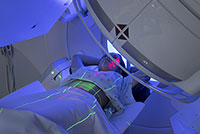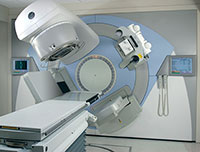Arkansas Society of
Radiologic Technologists
Radiation Therapy

Radiation therapy is a type of cancer treatment that uses beams of intense energy to kill cancer cells. Radiation therapy most often gets its power from X-rays, but the power can also come from protons or other types of energy. The term "radiation therapy" most often refers to external beam radiation therapy. During this type of radiation, the high energy comes from a machine that aims the beams at a precise point on the body. During a different type of radiation treatment called brachytherapy (brak-e-THER-uh-pee), radiation is placed inside the body.

Radiation therapy damages cells by destroying the genetic material that controls how cells grow and divide. While both healthy and cancerous cells are damaged by radiation therapy, the goal of radiation therapy is to destroy as few normal, healthy cells as possible. More than half of all people with cancer receive radiation therapy as part of their cancer treatment. Doctors use radiation therapy to treat just about every type of cancer. Radiation therapy is also useful in treating some noncancerous (benign) tumors.
Radiation therapy is an option at different times during your cancer treatment and for different reasons, including:
As the only (primary) treatment for cancer
Before surgery, to shrink a cancerous tumor (neoadjuvant therapy)
After surgery, to stop the growth of any remaining cancer cells (adjuvant therapy)
In combination with other treatments, such as chemotherapy, to destroy cancer cells
In advanced cancer to alleviate symptoms caused by the cancer



